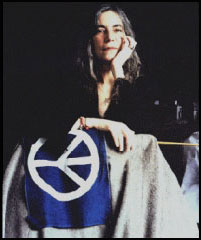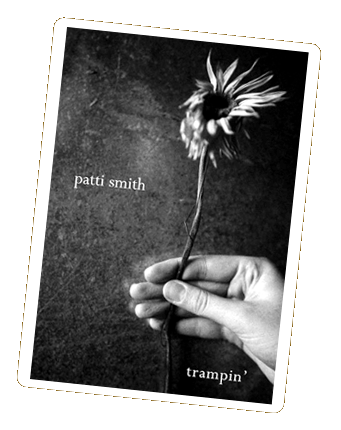patti
smith on trampin' Interviewed
by Todd Baesen
Exclusive
to Sari Gurney's website www.kaapeli.fi/aiu/ps
Summer
2004
With her ninth album, Patti
Smith, that protean American artist, has served up a tasty concoction of musical
treats that is both food for thought and a delight to the ears. It's akin to experiencing
the first day of spring, after a long, harsh winter. The highly ambitious album
celebrates all that is best in American ideals and values, starting with the seminal
documents prepared by our founding fathers 228 years ago, The Declaration of Independence
and The Bill of Rights. In short, it is as American as mom and apple (or Gone)
Pie. It's exuberant tone of joy and optimism is all the more remarkable, in that
much of it's subject matter - The war in Iraq, the disenfranchised and homeless,
death and dying - are hardly topics one associates with cheeriness. However, they
are all part of life and living in the world today, and Smith and her band wisely
treat these issues in a simple and direct musical style that never allows an overabundance
of production to obscure the power of her lyrics.

jubilee The
album kicks off with a jubilant "Jubilee," a folksy tune suggesting
a dance hall meeting at a frontier hoedown. But the bubble of beatitude bursts
suddenly when war mongering hawks appear in the sky like kamikaze's ready to "scatter
our glad day with debt and despair" amidst the pristine beauty of the American
landscape. Smith also issues a sobering warning, that "our vital realms are
being squeezed, curtailing civil liberties," before appealing to the American
sense of justice and fair play, with a refrain of "recruit the dreams that
sing to thee - Let freedom ring!"

Was the Hoedown Hall you describe in your book
"Woolgathering" in the back of your mind when you wrote the lyrics to
"Jubilee"? PATTI SMITH: i was raised across
the street from hoedown hall - a square dance hall - and that music is part of
me. the fiddlers call. the peoples response. i thought the spirit of jubilee merited
a fiddle. And our engineers mother, rebecca weiner played fiddle on libby's song
on gung ho. I noticed that in your manuscript page for
"Jubilee," there isn't a reference yet to William Blake's painting,
Glad Day. Did you add that as a last minute inspiration? PATTI
SMITH: i can't remember. i only remember thinking later they were good words to
begin the album with. i wanted the first line to be joyous ("Oh glad day
to celebrate"). As Lenny Kaye notes, in the book of
Leviticus, God told Moses that the Hebrew slaves were to be freed every 50 years,
and during that Jubilee year, the land was to remain fallow. Was that an idea
you wanted to bring indirectly into "Jubilee," relating, as it does,
back to the slave theme of "Strange Messenger"? 
| PATTI SMITH: that is possible. It's
ironic that President Bush keeps talking about "letting freedom ring"
in Iraq, which is now the only reason he has left to justify going to war there.
Do you think the next President should commit to unilaterally withdrawing the
majority of US troops in Iraq and turning control over to a UN peacekeeping force? PATTI
SMITH: i'm not qualified to answer that question; a panel of Iraqi leaders should
be consulted. i am better at knowing when to prevent a mess than at cleaning one
up. The "Doves multiplying" lyric in "Jubilee"
resonates back to the cover image of "Wave," as well as to the doves
lyrics in "Frederick" and "When Doves Cry." When Robert Mapplethorpe
took the cover photograph of you for "Wave," was it hard getting the
doves into position? | PATTI SMITH: it
was not difficult. the doves were very friendly.

|

